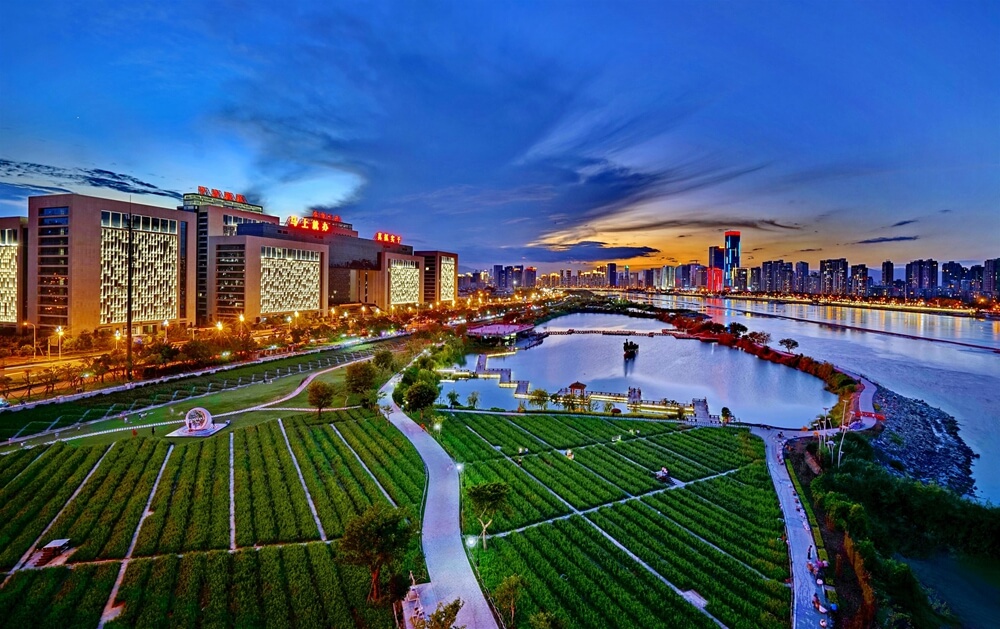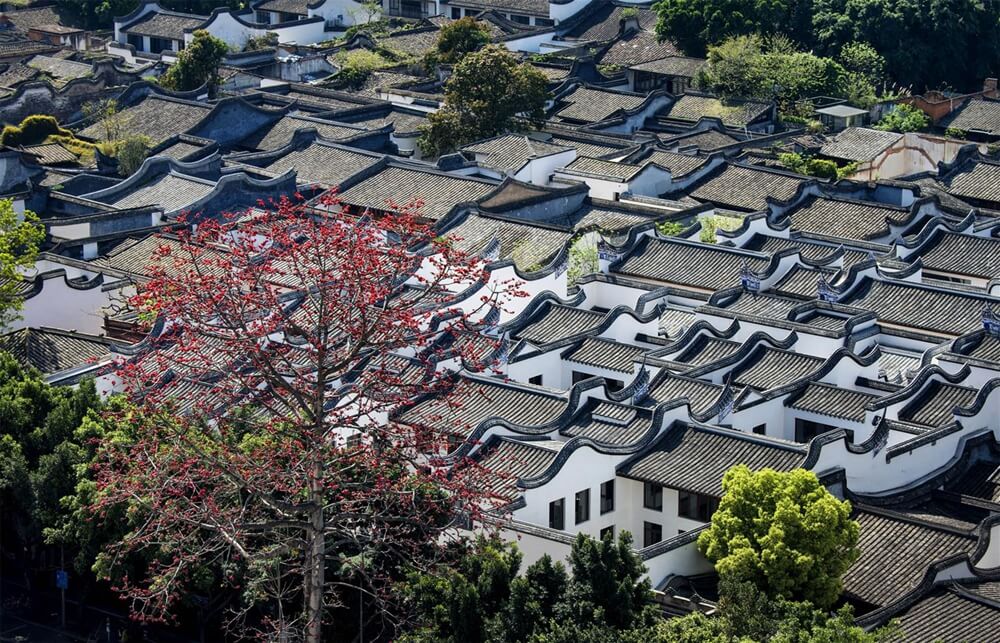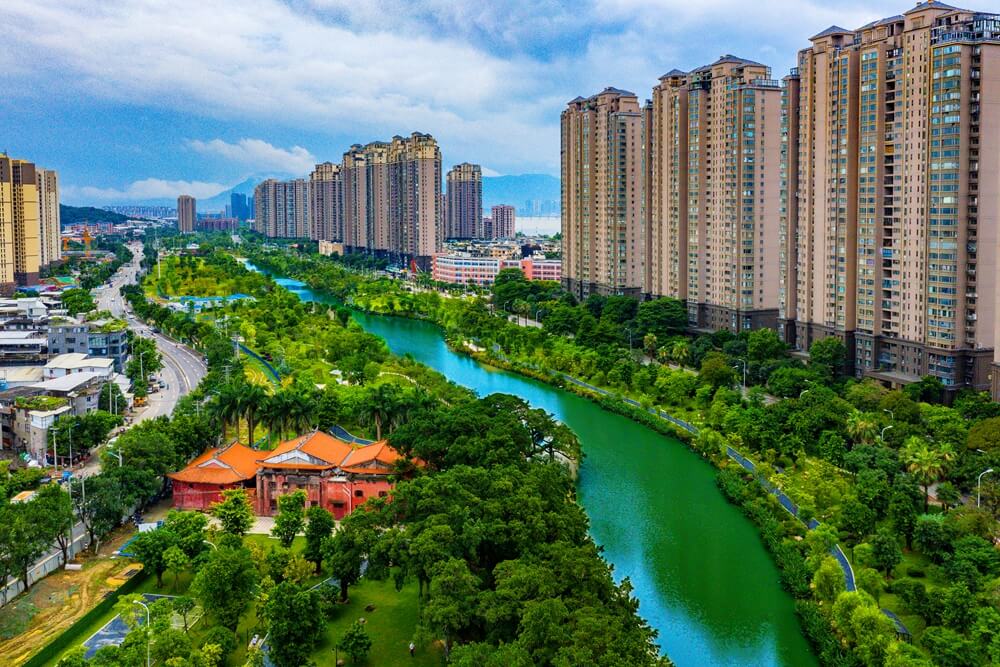Fuzhou, as the capital city of Fujian Province, locates on the southeast coast of China. Fuzhou is a city with beautiful mountains, clear waters, beautiful ecological endowments, a long history, and a gathering of talents, for which it is known as a Land of Blessings.

Fuzhou has been endowed with a good ecological environment and rich natural resources. The optimal temperature and warm and humid weather in Fuzhou have led to the wide plantation of banyan trees which are evergreen with lush branches and leaves all year round. Legend has it that the prefect named Zhang Boyu advocated "organizing each household to plant banyan trees" during the Northern Song Dynasty, which made it possible that "Fuzhou city is full of green shades, and no umbrella is necessary in the summer", for which Fuzhou was named "the city of banyans". According to historical records, during the Five Dynasties Period, Wang Shenzhi the King of the Min Kingdom expanded the scope of the Fuzhou City, and enclosed the beautiful sceneries of the Yushan Hill, Wushan Hill and Pingshan Hill in the city to form a unique pattern of "hills in the city and the city surrounded by mountains", for which Fuzhou is also known as the "Three Hills (Sanshan)". Minjiang River, the largest river in Fujian Province and the mother river of Fuzhou City, runs through the city like a green belt. This is why the title of "Three Hills and One River" has become the main symbol of the city. Today, Fuzhou is one of the cities with the best air quality and the greenest environment in China. It is also the most representative city of hot springs in China, and the urban districts contain extremely rich hot spring resources for tourism development. "Ecological and Green" has become a gorgeous name card of Fuzhou City.

Fuzhou City has a long history and profound cultural heritage. It has a history of more than 2,200 years as a city and is a National Famous Historical and Cultural City with 25 major monuments protected at the national level. The Three Lanes and Seven Alleys Culture, Tanshi Mountain Culture, Shipbuilding Culture and Shoushan Stone Culture are the four cultural name cards of Fuzhou's history and culture. In particular, the Three Lanes and Seven Alleys has been awarded the honorary title of "China's Top Ten Famous Historical and Cultural Streets" where more than 200 ancient buildings are preserved here, covering a total area of 45 hectares and divided into three lanes, seven alleys and a central axis street with rigorous layout and ingenious craftsmanship, for which it is known as a rare "Ming and Qing architecture museum". This city was the place of birth for a number of historical figures such as Lin Zexu, Shen Baozhen, Yan Fu, Lin Juemin, Bing Xin, to name a few. The Tanshi Mountain Cultural Relics, with a history of more than 5,500 years, are the most well-preserved prehistoric ancient human cultural site in China with the largest number of material objects as evidence and have the unique and distinctive features of marine civilization. Mawei Shipbuilding site was founded in 1866 and is the cradle of modern Chinese navy. Shoushan Stone is known as one of the highly collectable "Four Major National Stones" in China. Shoushan stone carvings, bodiless lacquerware, and cork paintings are known as the "Three Wonders of Fuzhou". The ten item of State-level Intangible Cultural Heritage such as Min Opera, the art of storytelling, and Chichang Opera also have a long history. The rich and colorful traditional skills embody the nostalgia of Fuzhou and convey the memories of Fuzhou.

Fuzhou City boasts of rich tourism resources, a developed economy and a high degree of openness. Fuzhou is an excellent tourist city in China and has 52 scenic spots of Grade 3A and above. Fuzhou's natural resources and human resources complement each other and have created four major tourism brands of "Rich Mindu Culture Tour, Therapeutic Hot Spring Tour, Refreshing Landscape Tour, and Beautiful Coastline Tour", which have attracted many tourists from home and abroad. Fuzhou is also the well-known hometown of overseas Chinese with more than 4 million overseas folks from Fuzhou distributed in more than 160 countries and regions in the world. It is one of the first Chinese coastal port cities to open to the outside world, the gateway to the Maritime Silk Road, and one of the three areas of China (Fujian) Pilot Free Trade Zone. With its trading partners spreading all over the world, Fuzhou has witnessed its total import and export volume continuing to grow, and the comprehensive strength continuing to grow accompanied by a booming economy.